Part Two of REGGAE: The Story of Jamaican Music continues in the next section.
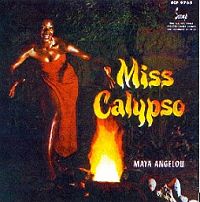 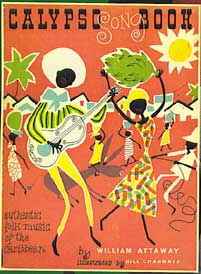 |
Nineteen-fifty-seven.
The
United States
was in the grip of Calypsomania. and some were even going so far as. to predict
that the calypso would soon eclipse Rock n’ Roll.
Before it all blew over, Robert Mitchum, Maya Angelou the Norman Luboff
Choir, and many others had made Calypso albums. Calypso, of course, was
Trinidadian, but the two big Calypso era hits, "Banana Boat Song” and
"Jamaican Farewell," were Jamaican; so Calypso was reckoned to come
from Jamaica. |
| As the craze subsided,
a Billboard magazine reporter sniffed
out a free vacation and went to
Kingston
to see what the Jamaicans liked. To
his surprise, it was rare R&B; not Calypso. "Local observers,” he
wrote, "note that the local musical product is developing into a hybrid in which
the strongest elements are calypso and rock & roll.”
Understandably, the writer missed the pan-African underground springing
up in Kingston’s slums, but ten years later pan-Africanism would merge with
American R&B and Caribbean music in those same back alleys to forever change
global music.
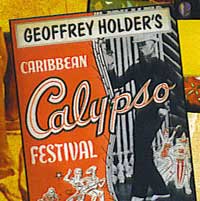 Around
1960, Ska evolved from Jamaican R&B. The Billboard article
mentioned that Fats Domino was the
most in demand artist on the island, so it was probably no coincidence that Ska
arrived on the heels of three influential American releases: Fats Domino's
"Be My Guest" (1959), Wilbert Harrison's "Kansas City" (also
1959), and Rosco Gordon's "Surely I Love You" (1960). All three worked
the offbeat for all it was worth. Bill Black's Combo figured somewhere in the
equation, too. Black's greasy instrumental hits featured a hugely upfront
four-to-the-bar beat, and sold so well in
Jamaica
that he toured there - to the surprise of many who found out that he was white. Around
1960, Ska evolved from Jamaican R&B. The Billboard article
mentioned that Fats Domino was the
most in demand artist on the island, so it was probably no coincidence that Ska
arrived on the heels of three influential American releases: Fats Domino's
"Be My Guest" (1959), Wilbert Harrison's "Kansas City" (also
1959), and Rosco Gordon's "Surely I Love You" (1960). All three worked
the offbeat for all it was worth. Bill Black's Combo figured somewhere in the
equation, too. Black's greasy instrumental hits featured a hugely upfront
four-to-the-bar beat, and sold so well in
Jamaica
that he toured there - to the surprise of many who found out that he was white.
|
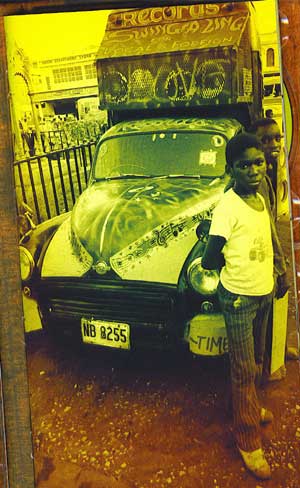
|
|
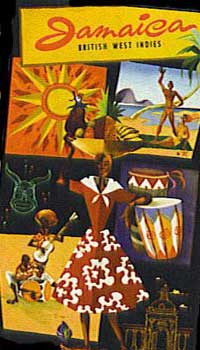
|
It's axiomatic that there are no facts in
Jamaica
, only opinions, so no one knows what "Ska" means and no one agrees on
what was the first Ska record. But around 1960, Jamaican drummers began hitting
the second and fourth beats in unison with the piano and guitar, while the bass
played walking quarter-notes. That was Ska. Local musicians called it
"Upside-down R&B." It had an underground following in England,
but not in the United States. One giant Ska hit, Millie's "My Boy
Lollipop," rode into the charts on the back of the British Invasion, and
when it exited, Ska exited along with it. |
|
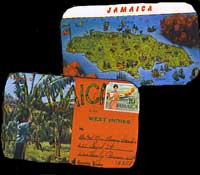
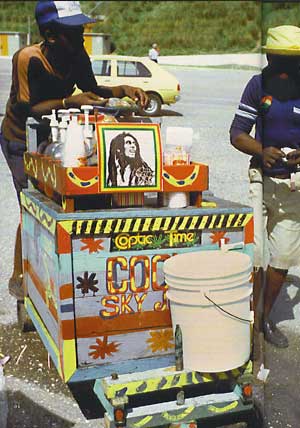
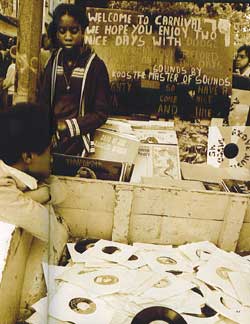
|
'Whatever
was happening in
Jamaica
didn't go away when Millie hit the remainder bins. The local industry was
building inexorably. The 1951 Billboard article
mentioned that there was just one record press on the island (not one pressing
plant, but one press) although local entrepreneur Ken Khouri claimed to have two
presses running by 1954· Around 1957; Khouri built a studio, and Dada Tawari
opened the Caribbean Record Company with mastering facilities. From that point,
the Jamaican industry was self-sufficient, albeit geared toward faux calypso
LP’s for tourists.
"Alongside
the tiny manufacturing industry, there were open-air deejays known as sound
systems. “A cliff face of speaker
boxes, each big enough to raise a family in, powered by amplification of
intercontinental capability," is the way journalist Lloyd Bradley described
them. There was life-and-death competition among the system operators to source
the rarest American R&B and the best technology.
The systems were essential to the dissemination of music because the island’s
two radio stations, RJR (launched in 1950 as a branch of British Rediffusion)
and the government's JBC (which started in 1959), played it as safe as the BBC
mothership; The payoff for the sound system operators, came in prestige and
drink sales. Three sound system men ruled the early Sixties: Duke Reid, Clement
"Coxsone" Dodd, and Prince Buster.
Both Reid and Dodd began operating from family liquor stores. The idea of
producing records occurred first to Reid, who cut some instrumentals at Khouri's
studio circa 1957. Around the same time, Dodd realized that Jamaicans didn't
like rock 'n' roll, and began recording the kind of R&B that the Americans
were no longer producing. In 1958, Chris Blackwell launched R&B Records (the
precursor of
Island
) and future Jamaican Prime Minister Edward Seaga launched WIRL (West Indies
Records Ltd.).
|
![]() Go to Part Two or Part Three
Go to Part Two or Part Three

![]() Go on to Part Two: Ska, Rocksteady, Reggae
Go on to Part Two: Ska, Rocksteady, Reggae![]() Bob Marley Feature - R&R
Hall of Fame
Bob Marley Feature - R&R
Hall of Fame ![]() Marley Feature Part Four
(Roger Steffens Chronology)
Marley Feature Part Four
(Roger Steffens Chronology) ![]() Bob Marley & The
Wailers Tour Dates
Bob Marley & The
Wailers Tour Dates ![]() Perry Henzel's Interview with
Bob
Perry Henzel's Interview with
Bob ![]() A Trip to Nine Mile:
May He Rest In Peace
A Trip to Nine Mile:
May He Rest In Peace